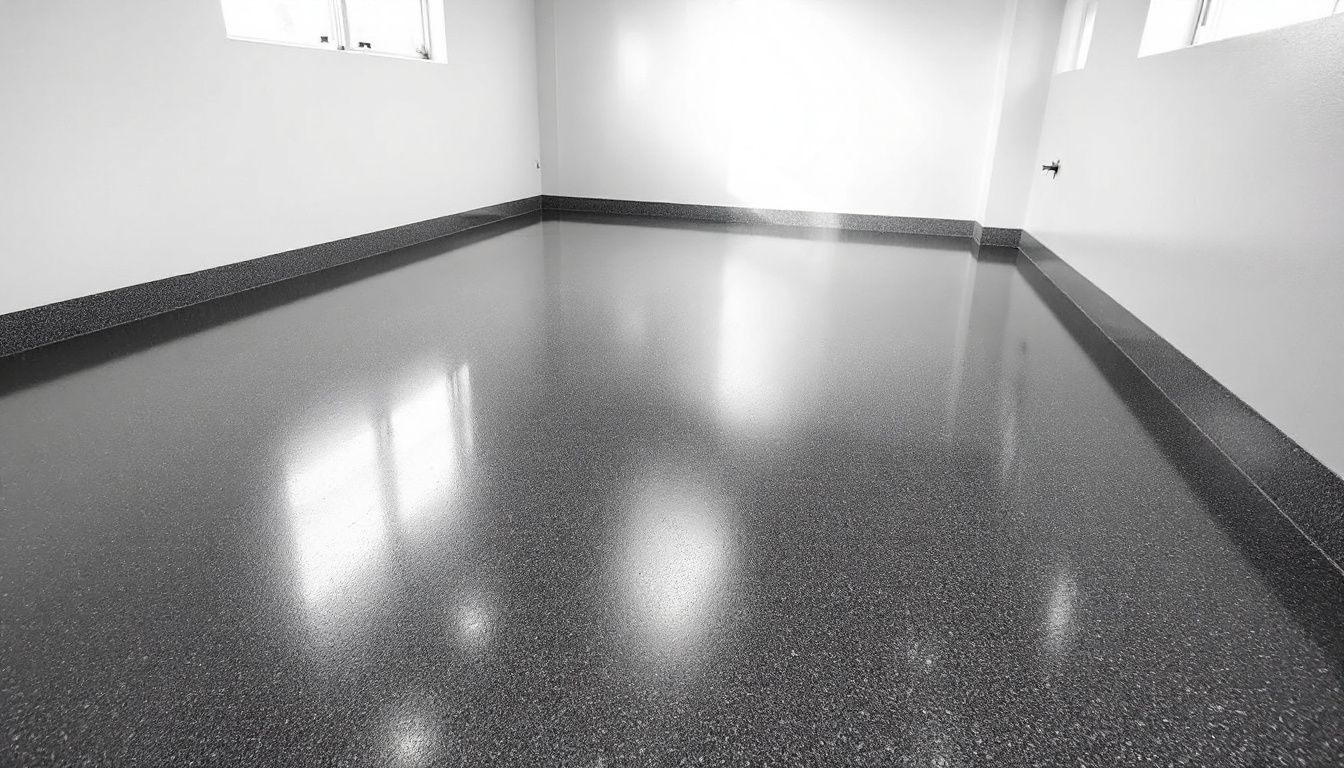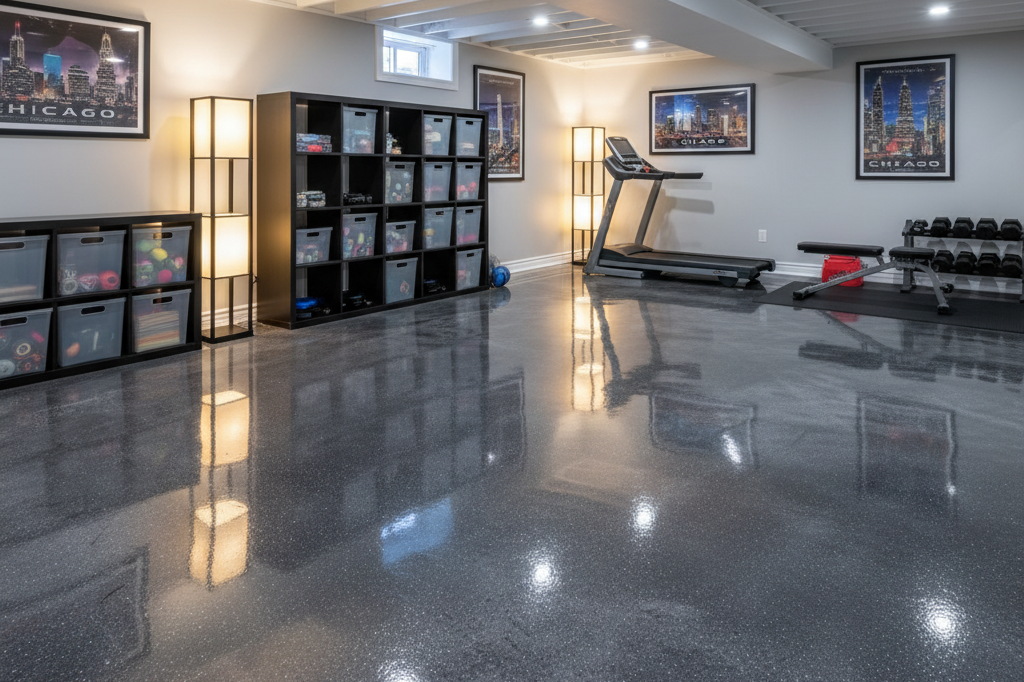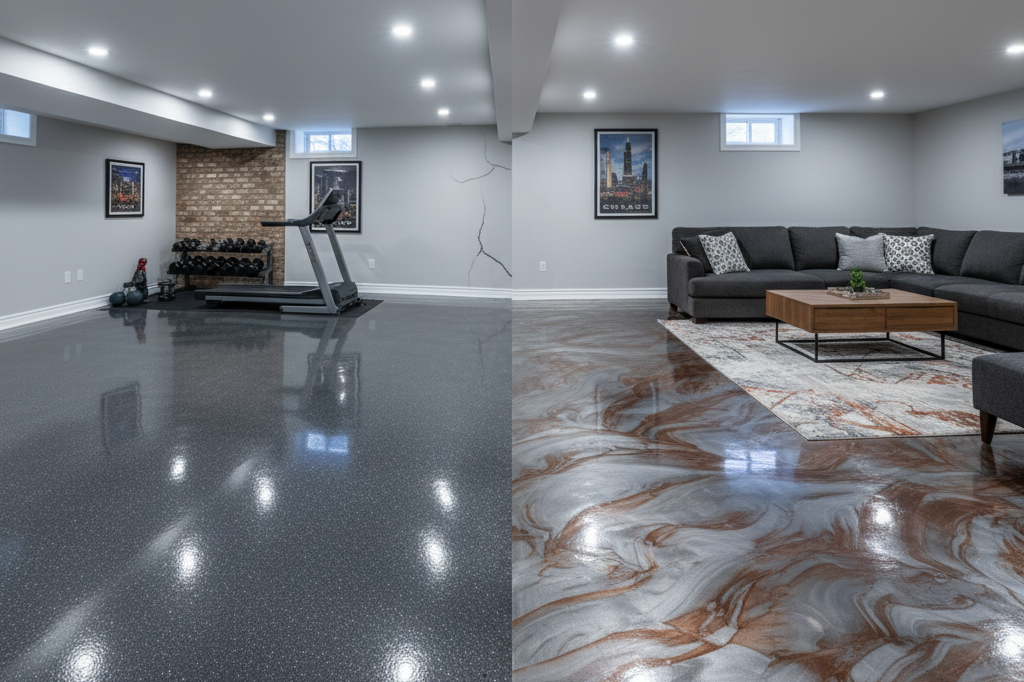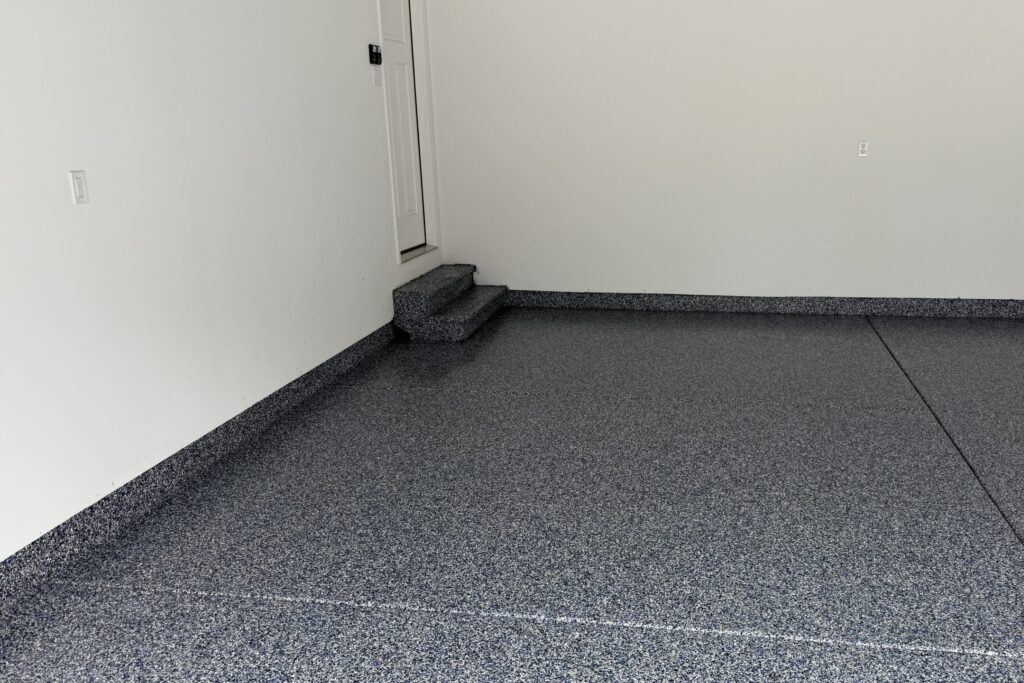If you’ve been staring at your garage or basement floor lately and thinking, “This space could really use an upgrade,” you’re not alone. More and more homeowners are discovering the sleek, polished look and long-term durability that epoxy flooring offers — and it’s not just about aesthetics. Epoxy can completely transform a dull concrete floor into a tough, high-gloss surface that’s resistant to stains, cracks, and everyday wear and tear.
But here’s the question that always comes up first: how much does epoxy flooring cost? And the honest answer is—it depends. From the type of epoxy you choose to whether you go DIY or hire a pro, several factors can influence the final price tag.
In this guide, we’ll break down everything you need to know before coating your garage or basement floor in epoxy. You’ll learn what goes into the cost, how to compare your options, and how to avoid paying more than you need to. Whether you’re upgrading for style, function, or resale value, this article will help you make the smartest choice for your home (and your wallet).
Let’s dive in and figure out if epoxy flooring is the right investment for you.
What Is Epoxy Flooring & How Does It Work?

Before we jump into pricing, let’s get clear on what epoxy flooring actually is — because it’s a bit more than just paint for your floors.
An epoxy floor is created by mixing a resin with a hardener, which together form a super-strong, plastic-like coating once applied to concrete. When it cures, the result is a seamless, glossy finish that not only looks sharp but also holds up under heavy wear. Think: dropped tools, spilled oil, muddy boots, and even hot tires — epoxy can handle it all.
What makes it especially appealing is its versatility. It’s popular in garages for its durability, in basements for its moisture resistance, and even in commercial spaces where tough, low-maintenance flooring is a must. You can choose from basic gray for a clean, industrial look, or go bold with colorful flakes, metallic sheens, or textured finishes that add grip and personality.
Plus, epoxy doesn’t just sit on top of your floor — it bonds with the concrete underneath, creating a surface that’s as durable as it is stylish.
So whether you’re upgrading your garage for function or turning your basement into a livable hangout space, epoxy offers a lot of value in both looks and performance.
Epoxy Flooring Cost Breakdown: What to Expect

Let’s face it—when considering any home upgrade, the first thing most of us think about is “What’s this going to cost me?” And with epoxy flooring, the answer isn’t one-size-fits-all.
There are a few key factors that impact how much you’ll end up investing, whether you’re working on a garage or planning to upgrade your epoxy basement floor.
Size and Layout Matter
Larger areas naturally require more materials and more time to coat. Open, simple spaces are usually easier and faster to work with, while tricky layouts or areas with obstacles (like support poles or built-in shelving) may require more effort.
The Condition of Your Floor
A smooth, clean surface is ideal — but if your concrete has cracks, stains, or moisture issues, it’ll need some prep before epoxy can even be applied. Surface prep plays a huge role in the overall time and complexity of the project.
Type of Epoxy and Finish
From basic coatings to high-gloss or decorative finishes with color flakes or metallic swirls, the look you want will influence what kind of materials are used. Some epoxies are thicker and more durable, while others are designed more for aesthetics.
DIY or Professional Help
You can tackle epoxy as a DIY project if you’re confident with tools and willing to do the prep work. But a professional can ensure a longer-lasting, better-looking finish — especially in spaces like basements where moisture and humidity can be unpredictable.
In short, epoxy flooring is customizable — and your final cost will reflect the choices you make. Think about how you plan to use the space, and work from there.
Epoxy Garage Floor Coating: What You Need to Know

The garage isn’t just for parking anymore. These days, people are turning garages into home gyms, workshops, man caves, or simply cleaner, more organized storage spaces. And one of the easiest ways to upgrade the whole vibe? A durable epoxy garage floor coating.
Here’s why it’s such a popular choice: epoxy creates a seamless, high-gloss finish that instantly makes your garage feel less like a utility space and more like a polished extension of your home. But it’s not just about looks—it’s about performance, too.
Built to Handle the Rough Stuff
Garages take a beating. Between car tires, tools, spills, and foot traffic, the floor needs to hold up. Epoxy is tough—it resists oil, gas, road salt, and even hot tire marks, which means less staining and easier cleanups.
Less Dust, More Shine
Bare concrete tends to shed dust over time, which can be annoying and messy. Epoxy seals the surface, so no more concrete dust coating your storage bins or car tires.
Add Safety and Style
You can even customize the finish with anti-slip textures to keep the floor safe, especially in wet or snowy climates. And if you want to add some personality? Flake finishes or colored coatings let you get creative.
So whether you’re storing tools or showcasing your classic car, epoxy gives your garage a clean, professional look that holds up to whatever you throw at it.
Basement Flooring with Epoxy: Benefits and Considerations

Let’s be honest—basements don’t always get the attention they deserve. Whether it’s a storage zone, a workout space, or the future home of your movie room, the right flooring can make a huge impact. And if you want something that’s clean, durable, and low-maintenance, epoxy is definitely worth considering.
One of the biggest perks of using epoxy in a basement is its ability to handle moisture. Since basements tend to be more humid or prone to dampness, traditional flooring materials like carpet or hardwood can be risky. Epoxy, on the other hand, forms a protective seal over the concrete that helps keep moisture out and mold at bay. It’s a solid solution for creating a healthier, longer-lasting space.
Another reason people love it? It’s just so easy to live with. An epoxy basement floor holds up well to everyday life—think workout equipment, playtime with kids, or dragging storage bins in and out. And cleanup is a breeze. No grout lines, no fibers to trap dust—just a smooth, sealed surface that wipes down with minimal effort.
Visually, epoxy also helps brighten things up. Basements often suffer from low light, and the glossy finish of epoxy reflects light in a way that instantly makes the room feel more open and inviting. And because there are so many finishes and color options, you can tailor it to match the mood or purpose of the room—whether you’re going for sleek and modern or fun and functional.
So if you’ve been thinking about giving your basement a fresh new look, epoxy might just be the upgrade that ties it all together.
Epoxy vs. Other Flooring Options: How Does It Stack Up?

When you’re weighing your options for a garage or basement floor upgrade, it’s easy to get overwhelmed. Concrete sealers, tiles, vinyl, polished concrete—they all have their place. But how does epoxy really compare?
For starters, durability is where epoxy shines. It bonds directly to your concrete floor, creating a tough, seamless surface that holds up against wear and tear better than many alternatives. While something like vinyl can peel or warp over time, especially in damp environments, epoxy stays put. That makes it a solid choice for high-traffic or high-impact areas like garages and basements.
Tile is another popular option, especially for people who want a more decorative look. But tile comes with grout lines, which can be a pain to clean—especially in a space where dirt, grease, or dust tend to build up. Epoxy, on the other hand, gives you a smooth surface that’s easy to mop or wipe down.
Then there’s the visual factor. A well-done epoxy garage floor coating doesn’t just protect your space—it elevates it. It offers a clean, modern finish that reflects light, hides imperfections in the concrete, and can be customized to fit your style.
While no flooring is perfect for every situation, epoxy holds its own when it comes to balancing function, style, and longevity. If you’re looking for something that’s tough, attractive, and easy to maintain, epoxy definitely deserves a spot at the top of your list.
Also read: Garage Epoxy Flooring vs. Other Coatings: Which is Best for Your Space?
Conclusion: Is Epoxy Flooring the Right Fit for Your Space?
Whether you’re upgrading your garage, finishing your basement, or just tired of looking at plain concrete, epoxy flooring offers a winning combination of durability, style, and low maintenance. It holds up against heavy use, resists stains and moisture, and can totally transform the look and feel of your space.
As we’ve covered, epoxy flooring cost depends on a few key factors—like the condition of your floor, the finish you choose, and whether you decide to DIY or bring in the pros. But more than anything, it’s about finding the right solution for your home and how you plan to use the space.
If you’re aiming for something that’s built to last and easy to keep clean, epoxy is hard to beat. From sleek garage floors to moisture-resistant basement makeovers, it’s a smart, stylish investment that pays off in both looks and longevity.
Still exploring your options? Take the next step—check out more of our guides on epoxy design ideas, DIY prep tips, or connect with a local flooring expert to get personalized advice for your project.
Your floors are the foundation of your space—make them something you’re proud of.



